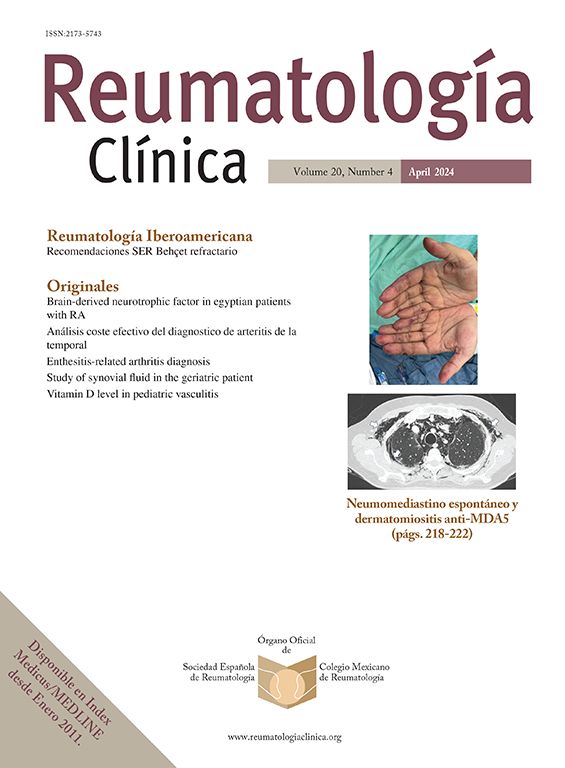Transverse myelitis (TM) is a rare complication in patients with systemic lupus erithematosus (SLE). We reviewed a series of our SLE patients to determine the prevalence of TM, and evaluate the clinical characteristics, medical tests, evolution, and response to the treatment.
Patients and methodSix patients with TM were identified and underwent a neurological evaluation, MRI, electrophysiologic study, and were all subjected to the same treatment. A descriptive statistical study was conducted.
ResultsWe observed a prevalence of 0.92% in our patients with SLE. Eighty-three point three per cent had antiphospholipid antibodies and/or lupus anticoagulant. The MRI confirmed the diagnosis in 5 cases. Of the 5 patients with antiphospholypid antibodies, 3 were anticoagulated or took aspirin with a good neurological outcome, leaving 2 of them without posterior complications.
ConclusionsWe found a prevalence similar to that observed in other series, around 1%. The high prevalence of antiphospholypid antibodies in these patients, with good outcome in those anticoagulated or treated with antiplatelet agents suggests an important pathogenic role in the development of TM, and emphasized the possibility of adding to the standard treatment, antiplatelet agents, or anticoagulation.
La mielitis transversa aguda (MTA) es una rara complicación en los pacientes con lupus eritematoso sistémico (LES). Revisamos nuestra serie de pacientes con LES para determinar la prevalencia de MTA y analizar las características clínicas, las pruebas complementarias, la evolución y la respuesta al tratamiento.
Pacientes y métodoSe identificó a 6 pacientes con MTA que se sometieron a valoración clínico-neurológica, resonancia magnética y estudio electrofisiológico y recibieron el mismo tratamiento. Realizamos un estudio estadístico descriptivo.
ResultadosObservamos una prevalencia de MTA del 0,92% de nuestros pacientes con LES. El 83,3% presentaba anticuerpos antifosfolipídicos y/o anticoagulante lúpico. La resonancia magnética confirmó el diagnóstico en 5 de los 6 casos; 3 de los 5 pacientes con anticuerpos antifosfolipídicos fueron anticoagulados o antiagregados, con buena evolución neurológica; 2 de ellos han quedado sin secuelas.
ConclusionesEncontramos una prevalencia similar a la observada en otras series, en torno al 1%. La alta prevalencia de anticuerpos antifosfolipídicos en los pacientes, con buen resultado en los antiagregados o anticoagulados, indica un importante papel patogénico en el desarrollo de la MTA, y nos hace plantearnos la importancia de añadir al tratamiento estándar terapia antiagregante o anticoagulante.






